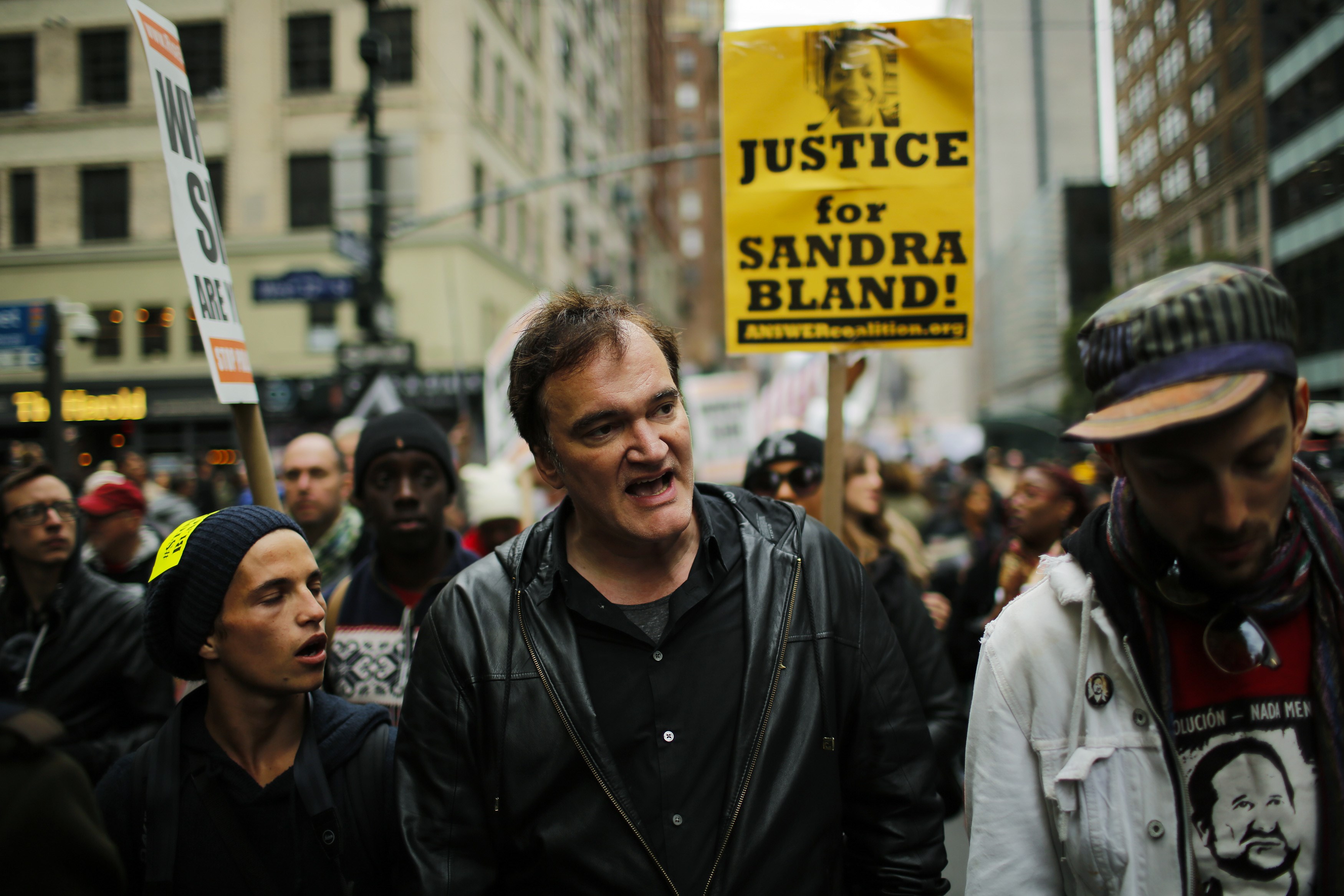Police unions urge boycott of Quentin Tarantino films because he protested police homicides


A free daily email with the biggest news stories of the day – and the best features from TheWeek.com
You are now subscribed
Your newsletter sign-up was successful
RiseUpOctober couldn't have asked for more publicity. On Oct. 24, director Quentin Tarantino flew from Los Angeles to New York to participate in a march by the group to protest police brutality, especially toward young black men. "I'm a human being with a conscience," he said during the march. "And if you believe there's murder going on then you need to rise up and stand up against it. I'm here to say I'm on the side of the murdered." The New York Police Department took umbrage, with its main union urging a boycott of Tarantino films. The Los Angeles Police Department's union joined the boycott on Tuesday, and the Philadelphia police signed on Wednesday.
Tarantino is a "cop-hater" who makes a living "glorifying crime and violence," said New York City Patrolman's Benevolent Association president Patrick J. Lynch. On Monday, New York City Police Commissioner William Bratton criticized the director for verbally attacking the police at a "time when we are grieving the murder of a New York City police officer," Randolph Holder. "There are no words to describe the contempt I have for him and his comments at this particular time," Bratton added.
RiseUpOctober said the police boycott and "cop-hater" rhetoric are an attempt to intimidate the group, Tarantino, and anyone else protesting police violence. The clear message, RiseUpOctober organizer Carl Dix said in a statement, is: "If you speak out, we will come after you, threaten your livelihood, and attempt to scare you back into silence." Social media tended to side with Tarantino:
The Week
Escape your echo chamber. Get the facts behind the news, plus analysis from multiple perspectives.

Sign up for The Week's Free Newsletters
From our morning news briefing to a weekly Good News Newsletter, get the best of The Week delivered directly to your inbox.
From our morning news briefing to a weekly Good News Newsletter, get the best of The Week delivered directly to your inbox.
Don't be surprised if Tarantino's next project involves some sort of police brutality of the silver-screen variety.
A free daily email with the biggest news stories of the day – and the best features from TheWeek.com
Peter has worked as a news and culture writer and editor at The Week since the site's launch in 2008. He covers politics, world affairs, religion and cultural currents. His journalism career began as a copy editor at a financial newswire and has included editorial positions at The New York Times Magazine, Facts on File, and Oregon State University.
-
 The Olympic timekeepers keeping the Games on track
The Olympic timekeepers keeping the Games on trackUnder the Radar Swiss watchmaking giant Omega has been at the finish line of every Olympic Games for nearly 100 years
-
 Will increasing tensions with Iran boil over into war?
Will increasing tensions with Iran boil over into war?Today’s Big Question President Donald Trump has recently been threatening the country
-
 Corruption: The spy sheikh and the president
Corruption: The spy sheikh and the presidentFeature Trump is at the center of another scandal
-
 ‘One Battle After Another’ wins Critics Choice honors
‘One Battle After Another’ wins Critics Choice honorsSpeed Read Paul Thomas Anderson’s latest film, which stars Leonardo DiCaprio, won best picture at the 31st Critics Choice Awards
-
 A peek inside Europe’s luxury new sleeper bus
A peek inside Europe’s luxury new sleeper busThe Week Recommends Overnight service with stops across Switzerland and the Netherlands promises a comfortable no-fly adventure
-
 Son arrested over killing of Rob and Michele Reiner
Son arrested over killing of Rob and Michele ReinerSpeed Read Nick, the 32-year-old son of Hollywood director Rob Reiner, has been booked for the murder of his parents
-
 Rob Reiner, wife dead in ‘apparent homicide’
Rob Reiner, wife dead in ‘apparent homicide’speed read The Reiners, found in their Los Angeles home, ‘had injuries consistent with being stabbed’
-
 Hungary’s Krasznahorkai wins Nobel for literature
Hungary’s Krasznahorkai wins Nobel for literatureSpeed Read László Krasznahorkai is the author of acclaimed novels like ‘The Melancholy of Resistance’ and ‘Satantango’
-
 Primatologist Jane Goodall dies at 91
Primatologist Jane Goodall dies at 91Speed Read She rose to fame following her groundbreaking field research with chimpanzees
-
 Florida erases rainbow crosswalk at Pulse nightclub
Florida erases rainbow crosswalk at Pulse nightclubSpeed Read The colorful crosswalk was outside the former LGBTQ nightclub where 49 people were killed in a 2016 shooting
-
 Trump says Smithsonian too focused on slavery's ills
Trump says Smithsonian too focused on slavery's illsSpeed Read The president would prefer the museum to highlight 'success,' 'brightness' and 'the future'
